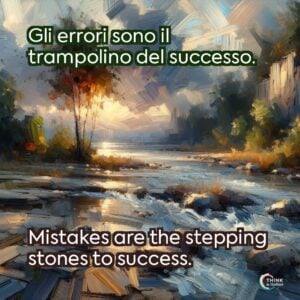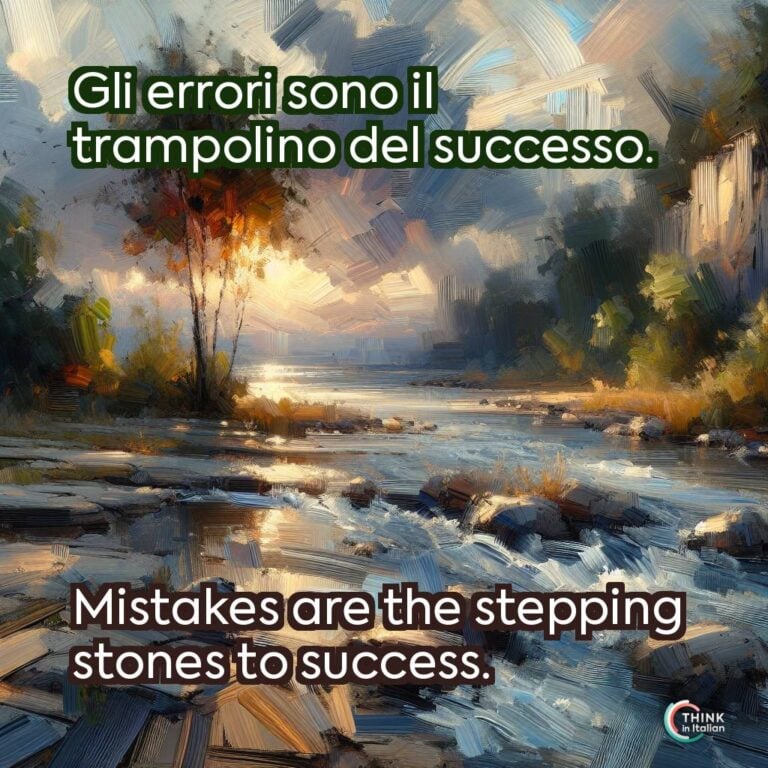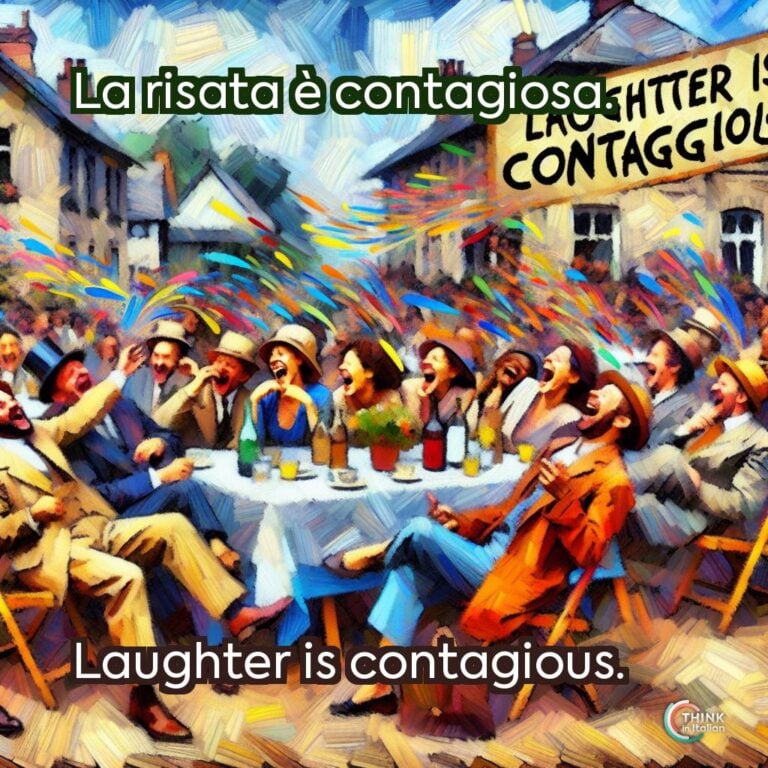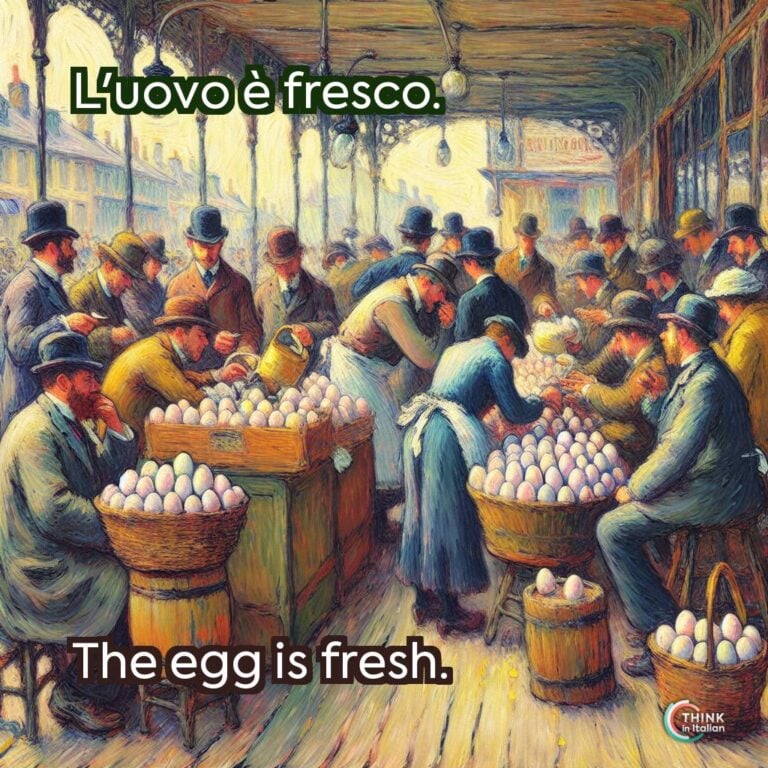What are One-Liners?
One-liners are concise and clever expressions that pack a punch with just a few words. The art of crafting an effective one-liner lies in the ability to convey humor, irony, or a thought-provoking idea briefly and memorably.
Italian one-liners have been perfected over generations, passed down through oral tradition, and embraced as an essential part of Italian comedy.
What I like about Italian one-liners is that they inevitably say a lot about Italian culture. Learn more about Italian humor and get to know more about Italians’ traditions and cultural nuances!
Best Italian One-Liners
As I mentioned before, sayings, proverbs, and humor reflect the culture of the speakers of a language. In this section I will show you some one-liners in Italian, their meaning, and cultural references.
They might not necessarily be the best one-liners, but they surely are my favorite ones!
Chi dorme non piglia pesci.
Whoever sleeps doesn’t catch fish.
This one-liner is similar to the English saying “the early bird catches the worm“. It essentially means that opportunities are more likely to come to proactive people rather than to inactive ones. Therefore, it humorously emphasizes that laziness leads to missed chances in life.
This expression is rooted in Italy’s rich history with fishing and agriculture, where hard work and early mornings were often necessary to achieve success. It reflects the typical Italian spirit of work ethic, effort, and initiative in achieving success.
Non tutte le ciambelle riescono col buco.
Not all donuts come out with a hole.
It conveys the idea that despite our efforts, some things may not turn out the way we expect, and that’s okay. In fact, would you ever throw away a donut only because it doesn’t have a hole? I wouldn’t!
A caval donato non si guarda in bocca.
Don’t look a gift horse in the mouth.
This one-line is also commonly used in English and many other cultures, and it basically emphasizes that people should not be critical or unappreciative of a gift or favor that was received, reminding us to value what we are given.
The origin of this expression can be traced back to the practice of evaluating a horse’s age and health by looking at its teeth. When receiving a horse as a gift, it was considered rude and ungrateful to inspect its mouth, as this implied doubt about the gift’s quality or the giver’s generosity.
The Italian culture values courtesy and respect in social interactions, and this expression underlines how important it is to appreciate the gesture behind a gift rather than its material value, which is an important value in the Italian culture.
Meglio un uovo oggi che una gallina domani.
Better an egg today than a hen tomorrow.
This one-liner is similar to the English “a bird in the hand is worth two in the bush“. It encourages appreciating what we have in the present rather than waiting for something better in the future, emphasizing the importance of seizing the moment.
This expression reflects a philosophical approach of Italian culture, where people tend to appreciate the here and now, making the most of the present moment rather than holding out for potentially greater future rewards.
This expression teaches the importance of pragmatism and appreciating what one has, rather than risking it all for something uncertain.
Italian Jokes as a Learning Tool
Is it Useful to use Italian One-Liners?
When it comes to understanding Italian humor, using jokes as a learning tool can be incredibly effective. Humor has a unique way of engaging our attention and retain information.
In fact, incorporating Italian jokes into your language learning can enhance your vocabulary, grammar, and pronunciation skills. Also, it will help you overcome apprehensions and build confidence in mastering the language.
Moreover, science confirms that the easier the environment in which you learn a language is, the faster you learn the language! In fact, laughter and enjoyment trigger positive emotional responses, which can facilitate deeper learning and retention of new linguistic structures.
Not only does using humor break the monotony of traditional learning methods, but it also connects learners with the cultural nuances and idiomatic expressions that are central in achieving fluency.
Why Should I Use Italian One-Liners in Everyday Life?
- You can use Italian one-liners in conversations as an icebreaker. It will ease social interactions and foster connections with native speakers.
- Embracing Italian one-liners as part of your daily communication will allow you to engage in light-hearted banter, lighten the mood in stressful or awkward situations, and make conversations enjoyable and memorable.
- Sharing laughs helps building relationships: sharing a good laugh with native speakers through one-liners creates a positive and enjoyable language-learning experience.
- Successfully using these expressions and eliciting laughter or smiles from others can significantly boost your confidence in social settings.
- Especially in language learning or cultural exchange contexts, understanding and using one-liners can provide insight into cultural nuances and humor styles.
How to Be Funny in Italian?
Something that I always tell my international friends is “you cannot even imagine how funnier I am in Italian!”, and this is so true!
Being funny in a foreign language is very hard, but with the right approach, a sprinkle of confidence, and a lot of practice, you can master the art of humor in Italian.
Here are my best tips to help you tickle the funny bone and engage in light-hearted banter with native Italian speakers:
- Learn humorous phrases: Learning common Italian phrases is useful in general, but by familiarizing yourself with the most common funny phrases and words, you will be able to add humor to your conversations.
- Use gestures and facial expressions: Italians are known for their expressive gestures and animated facial expressions. Incorporate these nonverbal cues into your humor to enhance the comedic effect and make your jokes more engaging.
- Practice timing and delivery: The timing and delivery of a joke are crucial to its success. Pay attention to the natural flow of conversation, and find the right moment to deliver your humorous lines. A well-timed joke can make all the difference in eliciting laughter.
- Observe and adapt: Pay attention to how native Italian speakers use humor in their daily interactions. Observe the types of jokes they make, the subjects they find funny, and the appropriate contexts for humor. Adapt your humor to suit the cultural nuances and sensitivities of your audience.
- Use self-humor: Italians often enjoy making fun of themselves in a lighthearted manner. Embrace this style of humor to connect with others and create a sense of camaraderie.
- Incorporate Italian Culture: Humor often reflects cultural references and societal norms. Familiarize yourself with Italian culture, traditions, and landmarks to make jokes that resonate with your audience and demonstrate your appreciation for their heritage.
- Laugh with others: Don’t be afraid to laugh at others’ jokes and show appreciation for their humor. is a universal language, and expressing joy when others make you laugh will encourage them to share more humorous moments with you.
- Be confident and relax: humor thrives in a relaxed and positive atmosphere. Be confident in your language skills, and don’t worry about making mistakes. Embrace the playful side of language learning and enjoy the process of making others smile.
- Practice: Like any skill, being funny in Italian requires practice. Engage in conversations with native speakers, join language exchange groups, or speak with an AI tutor to immerse yourself in the language’s humor.
Ready to Laugh?
Humor is a wonderful tool for building connections and making language learning enjoyable. In particular, Italians have an expressive nature that extends to their humor, making it an essential part of their social interactions and daily life.
In fact, Italian humor is renowned for its captivating charm, characterized by a unique blend of wit, wordplay, and cultural insights. And now, it is your time to embrace the playfulness of Italian culture!
I promise you that soon you’ll be sharing laughs and creating memorable moments with your Italian friends. Whether it’s a clever pun or a witty observation, Italian one-liners will make you laugh and enjoy every conversation.
Interested in learning Italian with Italian jokes for free.






